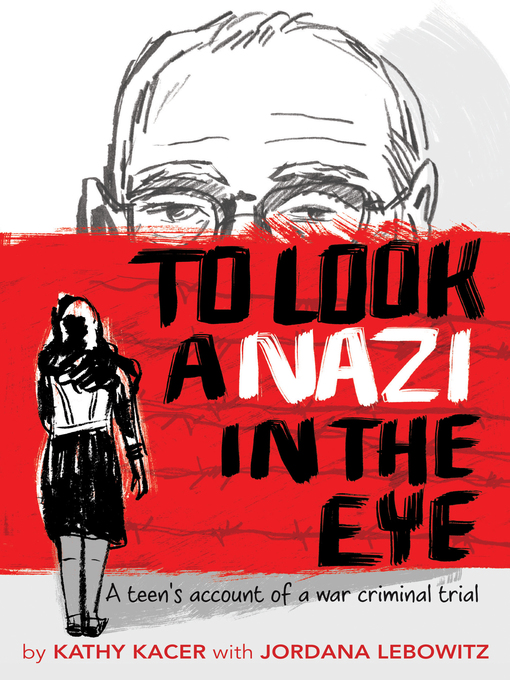To Look a Nazi in the Eye
A teen's account of a war criminal trial
-
Creators
-
Publisher
-
Release date
September 12, 2017 -
Formats
-
OverDrive Read
- ISBN: 9781772600414
- File size: 10475 KB
-
EPUB ebook
- ISBN: 9781772600414
- File size: 9897 KB
-
-
Languages
- English
-
Reviews
-
School Library Journal
September 1, 2017
Gr 7 Up-As a high schooler, Lebowitz participated in the International March of the Living, a program dedicated to bringing people to visit sites of the Holocaust, including Auschwitz. During her trip, she met survivors and forged strong friendships with some. Through these friendships, Lebowitz learned of the upcoming trial of Oskar Groening, a 94-year-old former SS agent. He was to stand trial in Germany for aiding and abetting the murder of 300,000 Jewish people at Auschwitz. Lebowitz knew she wanted to watch the trial firsthand. Through boldness and determination, she achieved her goal and sat in the courtroom for the first week of the trial and blogged about her experience. The eyewitness account reveals the complexity of her emotions-she wanted Groening convicted swiftly yet was moved by the frailty of the elderly man. However, her introspection, comprising much of the story, is rather dryly written. Alternatively, the verbatim testimony of both Holocaust survivors and Groening are truly gut-wrenching. The fact that with each passing year, fewer and fewer survivors are alive to tell their stories makes this account important. Although Lebowitz returned to Toronto before the trial's end, she continued to follow the proceedings and the eventual guilty verdict. The ordeal has since prompted Lebowitz to advocate for human rights worldwide. VERDICT Though a bit wordy, Lebowitz's account is a stirring reminder of the importance of history and activism.-Lisa Crandall, formerly at the Capital Area District Library, Holt, MI
Copyright 2017 School Library Journal, LLC Used with permission.
-
Kirkus
July 15, 2017
A 19-year-old's firsthand account of the war-crimes trial of a guard at Auschwitz/Birkenau.In 2015, a Canadian university student witnessed the war-crimes trial of Oskar Groening. Lebowitz, that student and the granddaughter of survivors, has partnered with Kacer (I Am Not a Number, 2016), herself the daughter of survivors, to give her account. Jordana joins a group of Canadian Auschwitz survivors traveling to Germany to testify. Facing 94-year-old Groening, Jordana's new friends describe the cattle cars and the selections that separated them from family members headed for gas chambers and the crematoria. One witness, a survivor of Josef Mengele's twin experiments, testifies to the medical experimentation to which she was subjected as a 6-year-old. Groening, tried not for firsthand murder but for enabling the Nazi death machine, is a prime example of the banality of evil. To Jordana's surprise, she meets many Germans dedicated to correcting the sins of the past, including a tour guide who explains, "my generation...want[s] to take responsibility for our country's past"--a good lesson to model for readers from other countries, perhaps. Kacer has reconstructed testimony from news articles and interviews, footnoting sources throughout; the telling is straightforward, relying on content for its impact. With living survivors seen through the eyes of a contemporary teen, the Holocaust is made present even through the uninspiring prose; 72 years after the liberation of the death camps, this immediacy is vital. (epilogue, author's note by Kacer) (Nonfiction. 11-15)COPYRIGHT(2017) Kirkus Reviews, ALL RIGHTS RESERVED.
-
Loading
Why is availability limited?
×Availability can change throughout the month based on the library's budget. You can still place a hold on the title, and your hold will be automatically filled as soon as the title is available again.
The Kindle Book format for this title is not supported on:
×Read-along ebook
×The OverDrive Read format of this ebook has professional narration that plays while you read in your browser. Learn more here.


